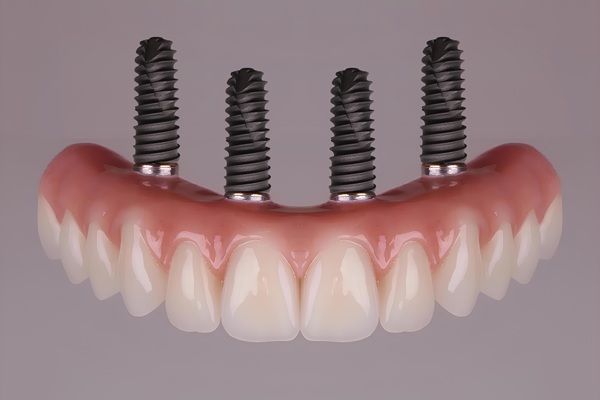Are Bleeding Gums a Sign of Gum Disease?

Most people have experienced seeing red on the bristles of their toothbrush, or a pink tint in the sink when they expectorate after brushing. It is normal to feel a bit of concern when noticing blood in the mouth because bleeding gums are a symptom commonly associated with gum disease. However, while chronic bleeding gums can be a cause for concern, it is normal for the gums to bleed now and then. Below is a breakdown of possible causes of bleeding gums as well as more information about gum disease.
What is gum disease?
One of the most serious causes of bleeding gums is gum disease, which occurs when plaque stays too long on the gum lines. To determine if this is the cause of the discomfort, it can be helpful to understand a little more about what gum disease is. Gum disease, or periodontal disease, is a bacterial infection in the gums. In the early stages, it is called gingivitis, which is an accumulation of hardened tartar near the gum line, which can cause swelling, irritation, and discomfort in the mouth and around the gums. Over time gingivitis can develop into a more serious case of periodontitis, an infection of the jawbone, gums, and the mouth's connective tissues. Periodontitis can be serious and painful, causing gum recession and even tooth loss if left untreated. Other symptoms of gum disease include pain and swelling along the gumline. Over time, affected patients may notice symptoms becoming more extreme. The gums may eventually begin to pull back from the teeth, making them appear longer. Early treatment is key to preventing gum disease from getting worse.
Other causes of bleeding gums
While gum disease is one potential reason that gums may bleed, there are other possible causes to be aware of. Occasionally, gums may simply become irritated, leading to bleeding here and there. This may happen after flossing the teeth overly aggressively or brushing too harshly. If a patient switches to a toothbrush that is too hard for their teeth, bleeding may happen frequently after brushing. Dentures or other restorations for the teeth that were not placed correctly can also lead to irritation in the gums. Certain health conditions, including bleeding disorders, can contribute to bleeding gums. Hormonal changes during pregnancy can result in bleeding gums. Certain blood-thinning medicines like aspirin, heparin, and warfarin can also cause gums to bleed. In less common cases, vitamin deficiencies may be the root cause of sensitive gums. Vitamins C and K can both be helpful in promoting healthy gums. Foods such as broccoli, brussels sprouts, and dark, leafy greens are rich in both of these vitamins and can easily be added to a healthy diet.
When to see a dentist
If the bleeding in the gums is more sporadic and does not happen often, it can be discussed with a dentist during a routine appointment. If a patient has noticed gum pain and bleeding frequently, it is advisable to schedule an appointment to get these symptoms looked at. Gum disease is most easily treated when it is caught early on. While it can be treated at all stages, treatments for more serious periodontitis are more invasive. Serious damage from prolonged periodontitis, such as lost teeth, may cause permanent changes to the mouth if left unaddressed.
How to treat bleeding gums
The first step to healthy gums is practicing good dental hygiene. Brushing and flossing frequently with proper technique will prevent plaque from forming at the gum line and reduce the risk of gingivitis. Antiseptic mouthwash is another tool for minimizing plaque. A salt water rinse is an easy way to soothe swollen gums that tend to bleed. A soft-bristled toothbrush is helpful for delicate gums that may experience bleeding after brushing. An electric toothbrush is another useful tool, as the specially designed heads on the toothbrushes are tailored to gently reach the gum line and will often be less abrasive than a traditional toothbrush.
Conclusion
Proper oral hygiene and regular appointments with a dentist can both help prevent gum disease and ensure that if it does begin to develop, it can be treated before it becomes serious. Gingivitis or periodontitis may the underlying reason for gums to frequently hurt, feel swollen, and bleed often. A dentist can detect early signs of gum disease and advise patients on the right course of action to restore the teeth to a healthy state. If the bleeding is less frequent, only occurring once in a while, it is likely nothing serious.
Request an appointment here: https://www.southfloridadentalarts.com or call South Florida Dental Arts at (305) 230-4041 for an appointment in our Miami office.
Check out what others are saying about our dental services on Yelp: Gum Disease in Miami, FL.
Recent Posts
Gum disease affects more than half of all adults in the United States, according to the International Journal of Health Sciences, and there are different forms of the condition. Gum disease is prevalent and one of the major causes of tooth loss. Therefore, it helps to understand the various stages of gum disease and its…
Receding gums will not only affect your smile, but if gums continue to recede they can cause nerve exposure and tooth loss. Schedule an appointment and find out how your gums may be preserved to save your teeth and your smile.
Oral cancer is described as one of the deadliest types of cancer. It is a deadly health condition with one of the highest mortality rates in the world. Men are more at risk of this cancer than women. Worse still, the risk increases with age. If you have been previously diagnosed with neck or head…
Preventative dental services include every action a dentist takes that is aimed at maintaining good oral health. This helps prevent consequences like cavities, enamel wear, and gum diseases. Experts recommend preventative dental care to avoid expensive dental treatments in the future.Preventive dentistry has multiple categories, and in this article, we will discuss the five most…


